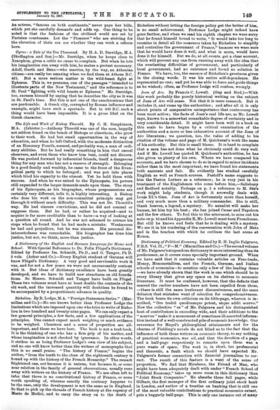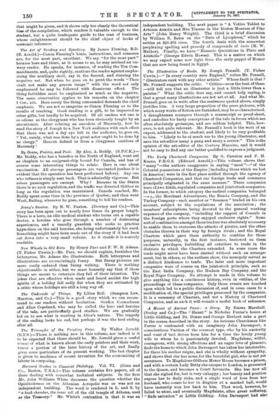Dictionary of Political Economy. Edited by R. H. Inglis Palgrave,
F.R.S. Vol. II.," F—M." (Macmillan and Co.)—The second volume of Mr. Palgrave's stupendous dictionary is more interesting than ite predecessor, as it covers some specially important ground. When we have said that it contains valuable articles on Free.trade, Money, Monometallism, and the French, German, and Italian schools of economics—to mention only a few of the leading items —we have already shown that the work is one which should be in every library that gives any space on its shelves to economic literature. It must be confessed, however, that the defects that marred the earlier numbers have not been expelled from these, —there is still the same irrelevant discursiveness, and the same delusion that mistakes want of selection for comprehensiveness. The book bears its own criticism on its title-page, whereon is in "Ore trahit quodctunque potest, atque addit acervo." Now the collective " os " of Mr. Palgrave and his distinguished host of contributors is exceeding wide, and their additions to the " acervus " make it a monument of sometimes ill-assorted informa- tion instead of a well-constructed pile of economic knowledge. Our reverence for Hegel's philosophical attainments and for the charms of Fielding's novels do not blind us to the fact that the influence of both these writers on economic theory, to say nothing of practical economics, was nil, and that the devotion of a page and a half-page respectively to remarks upon them was a pure waste of space. The work is, in short, too professorial and theoretic, a fault which we should have expected Mr. Palgrave's former connection with financial journalism to cor- rect. The result of this feature is a want of the sense of proportion. We find that Mirabeau, the Friend of Man, who might have been adequately dealt with under "French School of Political Economy," takes up more room in this dictionary than "Joint Stock Companies." He absorbs three full pages, while Gilbart, the first manager of the first ordinary joint stock bank in London, and author of a treatise on banking that is still one of the most valuable contributions to practical economics extant, gets a beggarly half-page. This is only one instance out of many
that might be given, and it shows only too clearly the theoretical bias of the compilation, which renders it valuable enough to the student, but a quite inadequate guide to the man of business, whose enlightenment should be the chief object of books of economic reference.



















































 Previous page
Previous page